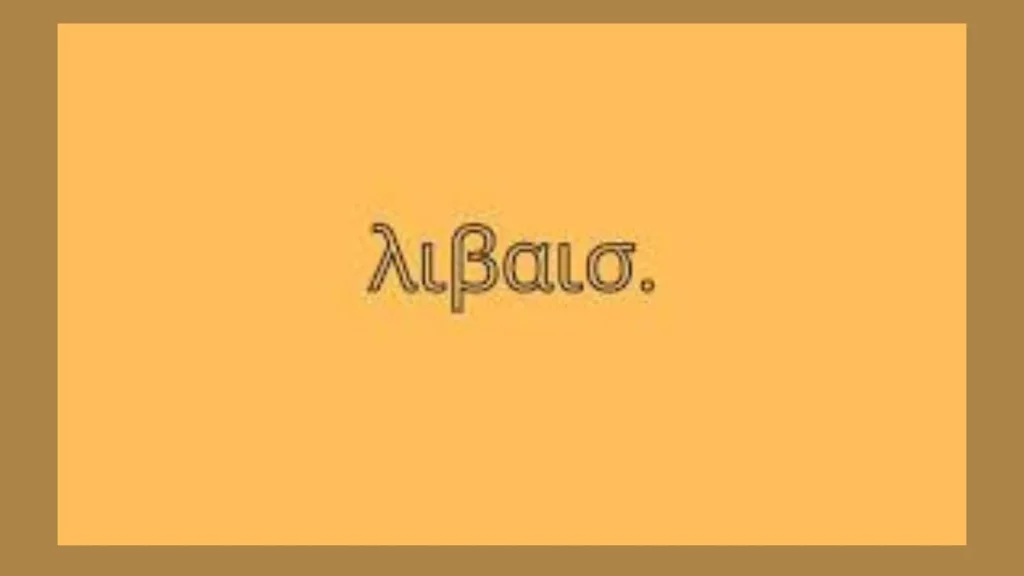In the vast expanse of linguistic diversity, the term λιβαισ stands out as an enigmatic expression that has intrigued scholars, linguists, and curious minds alike. Pronounced as “lee-vais,” this mysterious word has sparked debates and discussions across various disciplines. So, what exactly is λιβαισ, and why does it hold such fascination? Let’s journey to unravel the secrets behind this intriguing term.

The Linguistic Odyssey
At its core, λιβαισ is a word of ancient origin, deeply rooted in the Hellenistic era of Greek civilization. The term has evolved through centuries, maintaining its essence while adapting to the nuances of different cultures and languages. Translated literally, it signifies a profound sense of vitality, an embodiment of life itself. As language is the vessel that carries the essence of a culture, λιβαισ has become a linguistic bridge, connecting the ancient past with the modern present.
Cultural Significance
Beyond its linguistic roots, λιβαισ holds significant cultural connotations. In ancient Greek philosophy, it was often used to encapsulate living life to the fullest, embracing vitality, and cherishing the essence of existence. This cultural resonance has transcended time and space, permeating various societies and influencing art, literature, and philosophy across epochs.
Philosophical Reflections
The term λιβαισ finds a comfortable home in the realm of philosophy, serving as a philosophical anchor that tethers existential inquiries. Philosophers from different eras have contemplated the meaning of life, and λιβαισ emerges as a poignant expression encapsulating the pursuit of a prosperous, meaningful existence. From the Stoics to the Existentialists, the concept of λιβαισ has been a source of inspiration for those seeking to navigate the complexities of human experience.
Literary Echoes
In the world of literature, λιβαισ has left its indelible mark. Writers and poets have woven its essence into the fabric of their works, using it as a vessel to convey the vibrancy and vitality of life. Whether through the vivid descriptions of nature’s beauty or the exploration of human emotions, λιβαισ resonates as a literary motif that transcends linguistic barriers.
Modern Applications
While deeply rooted in antiquity, λιβαισ has not remained confined to the pages of history. In contemporary times, the term has found new life in various fields, adapting to the dynamic nature of language and culture. From motivational speeches to wellness practices, λιβαισ has become a rallying cry for those advocating a holistic and fulfilling lifestyle.
Linguistic Diversity
One fascinating aspect of λιβαισ lies in its adaptability across different languages. As cultures intermingle in our globalized world, this ancient Greek term has found resonance in various linguistic expressions. From the Romance languages to the languages of the East, λιβαισ is a testament to the universal human pursuit of a vibrant and meaningful life.
The Visual Aesthetics
Beyond its verbal expression, λιβαισ has also found a place in the visual arts. Artists embodying the λιβαισ philosophy create vibrant works—paintings, sculptures, installations—capturing the essence of living life to the fullest. The visual representation of this concept serves as a powerful reminder of the beauty and richness inherent in the human experience.
Embracing Wellness
In the realm of wellness, λιβαισ has become synonymous with a holistic approach to health and well-being. The wellness industry has adopted the concept of promoting practices that nurture both the body and the soul. λιβαισ ethos guides a balanced life, from mindfulness to embracing nature, fostering fulfillment for those seeking harmony.
Practical Applications
The concept of λιβαισ is not merely theoretical; it has practical applications in our daily lives. Prioritize experiences, cultivate connections, and savor the present moment for a richer, more fulfilling life. In a world often dominated by material pursuits, its serves as a gentle reminder to focus on what truly matters.
Challenges and Controversies
As with any profound concept, it is not without its challenges and controversies. Some argue that it is a romantic notion, detached from the harsh realities of life. Others contend that its interpretation varies widely, leading to misunderstandings and misappropriations. Thriving amid debates, it remains a dynamic, evolving concept, resonating deeply with individuals on a personal level.
Conclusion
In life’s mosaic, λιβαισ embodies a timeless, universal expression, transcending linguistic, cultural, and temporal confines with profound significance. Rooted in ancient Greek origins, this term inspires a vibrant, meaningful existence, connecting past wisdom with contemporary applications. Embrace life’s complexities with λιβαισ, finding beauty in each moment and acknowledging the profound vitality that courses through existence. In doing so, we embark on a journey of self-discovery and a celebration of the rich tapestry of life.




